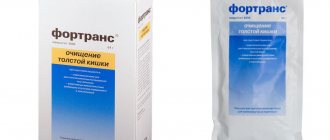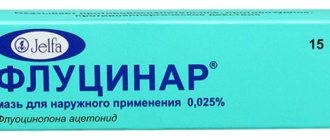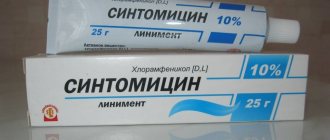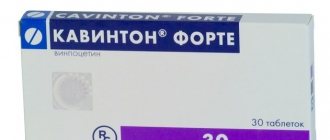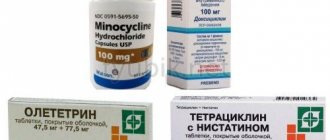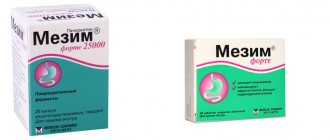Mechanism of action
Creon 25000 improves digestive processes due to the pancreatic enzyme substances it contains, facilitates the breakdown of food and improves the absorption of energy components (F/B/U).
Miniature microspheres are placed in a gelatin capsule, and each granule is additionally treated with an acid-protective compound.
The gelatin capsule dissolves in the stomach, the microspheres enter the intestines, where their protective shell dissolves and the enzymatic action of the drug begins.
How does the medicine work in the body?
Pancreatin, which is rightfully considered the main natural enzyme in the gastrointestinal tract, improves the digestion of protein that enters the body with food, as well as fats and carbohydrates. With the help of pancreatin, these components are broken down and absorbed into the bloodstream. An insufficient amount of enzymes can harm your health, since nutrients important for the normal functioning of the body will be absent.
After taking the capsule, its gelatin shell dissolves, as a result of which minimicrospheres are released from it, and then mixed with the contents of the stomach (usually acidic). After the shell dissolves, the drug components enter the small intestine, where they are completely dissolved and mixed with the intestinal contents.
An important point is that the dissolution of the main active component occurs only at a certain level of acidity. As a result, the concentration of drug enzymes in the small intestine sharply increases, which quickly break down and help absorb fats, proteins and carbohydrates.
After several tests, scientists were able to prove that when taking the medicine, there is no penetration of undigested components into the general bloodstream. Thanks to this, carrying out complex treatment with Creon, it will be possible to improve the digestive process and normalize the general condition of the body. The medicine works only in the small intestine, and therefore does not require absorption of its main components into the bloodstream. But since enzymes are proteins by nature, due to the action of Creon 25000 they are converted into certain components that can penetrate into the bloodstream.
These include:
In order for Creon to have a comprehensive effect on the patient’s body, it is necessary to take the capsules strictly according to the instructions, as well as to correctly observe the dosage of the medication. Otherwise, adverse reactions may occur, as well as deterioration in the functioning of the digestive organs.
Indications for use
Creon 25000 is used for replacement treatment of pancreatic enzyme deficiency, which most often develops against the background of the following pathologies:
- Oncology of the pancreas;
- Cystic fibrosis;
- Chronic pancreatitis;
- Obstruction of the pancreatic or bile ducts;
- Partial removal of the stomach;
- Recovery after surgical manipulations on the gland or stomach, gastrectomy, etc.;
- Restoring the diet after fasting during a pancreatic attack.
Symptoms and help during an attack of pancreatitis
Once the pancreatic channels become clogged, the outflow of gastric juice and digestive enzymes into the small intestine is disrupted.
Over time, enzymes begin to negatively affect the tissue of the gland, as a result, the organ begins to digest itself.
Pathological changes concern not only the pancreas, they spread to large blood vessels that pass behind the head of the organ (inferior vena cava, renal vein and the initial part of the portal vein).
In 95% of cases, the cause of pancreatitis attacks is poor nutrition, monotonous menu and constant overeating.
People who prefer a quick snack every day are most often at risk. At the same time, instead of healthy food, they constantly eat fatty, salty, fried and spicy foods, which is not recommended.
Bad habits and frequent stress also contribute to the development of inflammation of the pancreas.
The load on this organ is even greater in pregnant women, as well as in women who have just given birth to a child. It is during this period that their pancreas most often becomes inflamed.
In addition, the healthy functioning of the gland can be disrupted when the body is treated with antibiotics or when taking hormonal drugs.
Attacks of acute pancreatitis manifest themselves against the background of other diseases, for example, inflammation of the gallbladder or impaired liver function.
Often the disease appears as a result of trauma to the abdomen. Pain during exacerbation of pancreatitis is intense; it can be felt in the right hypochondrium and radiate to the back. Often the acute form of the disease accompanies hepatitis.
How to take Creon 25,000 for adults?
The drug is dosed individually in accordance with the severity of the pathological process and the patient’s diet. Gastroenterology doctors recommend taking half of the single dose before meals, and the remaining half during meals.
It is permissible to open the capsules and add their contents to a drink or liquid food if the patient has problems swallowing the medicine.
When using Creon therapy, it is important that the patient switches to increased water consumption in order to eliminate the likelihood of developing constipation. The dosage is individual, usually the patient is advised to take 25,000-80,000 units of the drug with the main meal, and for snacks, take half of the above dose.
There are no clinical data regarding the use of the drug by pregnant patients. When testing the drug on animals, no absorption of enzyme substances was detected, therefore, no toxic effect on the development of the fetus and the reproduction of patients is expected.
But for pregnant women, the drug is prescribed only by a specialist, taking into account that the therapeutic benefits will prevail over the potential risks for the child.
The same animal studies have shown that there are no negative effects on the baby through breast milk. Therefore, during lactation you can take Creon 25000, but in adequate dosages and under medical supervision.
What does Creon help with? Instructions for use
For diseases of the pancreas, as well as insufficient production of enzymes, doctors often prescribe enzymatic drugs, including Creon. Before using this drug, patients need to find out what the instructions for using the drug Creon are and consult with a doctor about a possible replacement of the drug if for some reason it is not possible to take it.
Composition and release form
The description of the drug Creon states that these are capsules that contain the main enzymes necessary for digesting food - lipase, protease, amylase, which together constitute the enzyme complex “pancreatin”.
Depending on the lipase content in the preparation, Creon 10000, Creon 25000, Creon 40000 are distinguished, which corresponds to the amount of lipase in one capsule. In addition to active enzymes, capsules contain excipients and are covered with a gelatin shell.
With the help of macrogol, liquid paraffin, hypromellose phthalate, dimethicone 1000, enzymes acquire a stable form in the form of a powder surrounded by a shell of iron oxide (red, yellow, black), gelatin and titanium dioxide. Each capsule contains minimicrospheres that are acid-resistant and dissolve only under the influence of intestinal contents, that is, at a pH above 5.5.
The drug is available in the form of capsules in packages of 20, 50 or 100 pieces. The capsules are packaged in polyethylene bottles. The manufacturer produces the medicine in three possible dosages.
Pharmacodynamics
Creon contains pancreatin in each capsule, which has the form of minimicrospheres. Once they enter the stomach, they begin to separate from each other and mix in the gastric contents. This is done in order to distribute enzymes throughout the food that enters the stomach.
Food, further moving through the digestive tract, enters the small intestine. There, thanks to the uniform distribution and alkaline environment, the mini-microspheres of the drug begin to dissolve. The released enzymes help in the process of digesting food and assimilate it into the body without problems.
The medicine eliminates side symptoms of enzyme deficiency such as:
- bloating;
- rumbling;
- increased gas formation;
- pain;
- feeling of heaviness.
The enzymes contained in the capsule contribute to the complete breakdown and absorption of both proteins, fats and carbohydrates. The drug itself is practically not absorbed by the body and is excreted along with decay products.
Indications for use
The drug is often prescribed to adults, but it is also suitable for children.
There are a number of diseases and conditions for which it is advisable to use Creon:
- Pancreatectomy.
- Chronic pancreatitis.
- Cystic fibrosis (Creon is most often prescribed to children with this diagnosis).
- Undergoing surgery on the pancreas.
- Shwachman-Diamond syndrome.
- During occlusion of the bile duct and pancreatic ducts.
- Pancreas cancer.
- Duodenostasis.
- Gastrostasis.
- Cholestatic hepatitis.
- Cholecystectomy.
- Cirrhosis of the liver.
Creon is prescribed only by a doctor according to indications, both for etiological therapy and for symptomatic treatment. It is not recommended to take the capsules on your own.
Contraindications
The drug should not be taken by people who have an increased susceptibility to any component of Creon, or complete intolerance to the active or auxiliary substances (considering that the drug is based on pork pancreatin). It is also prohibited for people with acute pancreatitis and during an exacerbation of the chronic form of this disease.
Mode of application
The use of Creon and its dosage should be based on the established diagnosis, as well as the degree of the disease. For children under four years of age, the drug should be used in a dosage of no more than 1000 units/kg per meal. Children over the age of four years should be given a dose of no more than 500 units/kg of body weight per meal. The daily dose for children should not exceed 10,000 units/kg. The exception is a personal recommendation from a doctor based on indications.
For adults, Creon should be used in dosage depending on the meal:
- three main meals should contain 20,000 - 70,000 units;
- snacks between meals – 5000 – 25,000 units.
A patient can take Creon at a maximum dosage of 80,000 units per meal.
Capsules should be swallowed without chewing and washed down with plenty of water. If it is difficult for the patient to swallow the capsule, then it should be opened and the contents mixed with an acidic product (apple juice or puree). Take the prepared mixture immediately orally and wash it down with water.
It is best to take a third of a single dose before meals, and the rest of the drug during or after meals. This way the enzymes are better distributed throughout the intestines and will start working faster.
Any appointments must be made by a doctor who is caring for the patient and monitoring his health and the progress or regression of the disease. You cannot change the dose yourself, much less increase it, as an overdose of the drug may occur.
Video:
Pregnant women, women during lactation
According to experiments conducted on animals, the negative effect of Creon on the body of the mother and fetus has not been established. Therefore, if the potential benefit to the mother is higher than the possible risk to the fetus, the doctor may prescribe enzymes.
Women during lactation can use Creon to normalize enzyme levels. The drug does not have any effect on the child, being excreted together with mother's milk.
The dose of the drug is prescribed individually for each patient by the doctor; exceeding this dosage is not recommended.
Side effects and overdose
In rare cases, after taking the drug, patients experience the following side symptoms:
- stomach ache;
- rash or other allergic skin manifestations;
- periodic constipation;
- diarrhea;
- nausea, rarely vomiting.
With prolonged use of Creon, the patient may develop gout, so if the body requires constant input of enzymes, you need to ask your doctor what substitutes for Creon are available.
In case of overdose, hyperuricosuria and hyperuricemia may occur. In this case, you should stop taking the drug, start using any other analogue of Creon and prescribe symptomatic treatment.
Storage conditions and shelf life
The drug should be stored in its original packaging at an air temperature of no more than 25˚C, out of the reach of children.
The shelf life of Creon is 2 years, but from the moment of first opening the drug should be consumed within three months. The use of Creon beyond this period, as well as after the expiration date, is prohibited.
Analogs
The enzyme preparation Creon has analogues that are similar in the active substance and mode of action, which are cheaper, or, on the contrary, more expensive.
You can replace this drug:
- Hepatophyte Forte;
- Gastenormom forte;
- Mezim (several variations);
- Micrasim;
- Unifestal;
- Festal;
- Panzinorm 10,000;
- Pangrol (10,000 and 25,000);
- Pancreatin (in three variations);
- Hermitalem;
- Stabilin;
- Enzisthalm.
A doctor should select a Creon substitute; you should not do this yourself.
The substitute may be cheaper if Creon is beyond your means, or have other ingredients if Creon’s composition is not suitable for you. Replacement drugs can be in the form of not only capsules, but also tablets, syrups, powders, so you can choose the form that is convenient for you.
What is the difference between Creon 10000 and 25000?
The difference between these two forms of the drug is not great, but it still exists, so let’s find out what it is.
Creon 10,000Creon 25,000
| Active ingredient: pancreatin | 150 mg | 300 mg |
| Lipase | 10,000 EF units | 25,000 EU units |
| Amylase | 8,000 EF units | 18,000 EU units |
| Proteases | 600 units EF | 1,000 EF units |
| Price | 280-680 rub. | 520-1300 rub. |
Price
Buyers are often primarily interested in how much Creon costs. After all, if you can buy a drug cheaper, why overpay? The main thing to remember is that when buying a cheap analogue, you are buying a completely different drug and you should not expect from it the same effect as from Creon.
Creon 10,000Creon 25,000Creon 40,000
| Moscow | 300-320 rub. | 500-600 rub. | 1400 rub. |
| Saint Petersburg | 290-300 rub. | 580-590 rub. | 1540 rub. |
| Novosibirsk | 300 rub | 590 RUR | 1550 rub. |
Reviews
Irina, Kharkov:
I had problems with digestion for a long time. I started drinking Creon 10,000 as prescribed by my doctor. Now the pain and bloating while eating are gone and I can allow myself to eat whatever I want.
Vladimir, Kyiv:
The doctor prescribed Creon due to weak pancreas function, he took it for a long time. I periodically suffered from abdominal pain, I had loose stools a couple of times, but after a couple of months my digestion returned to normal, although I still try to stick to the diet to this day.
Valeria, Kirovograd:
I was treating my stomach for a long time; after every meal I had heartburn and pain. I drank everything I could, in tablets, syrups, and gels, but nothing helped. It turned out that the treatment was incorrect, the problem was not in the stomach, but in a small amount of enzymes. I took a course of Creon and everything was restored, although nausea was observed from time to time, I am satisfied with the drug.
www.lechimzapor.com
Side effects
Among the adverse reactions to taking Creon 25000 are gastrointestinal disorders, which manifest themselves in the form of bloating and constipation, nausea and vomiting, but such gastrointestinal problems are more often caused by the underlying pathology. Rashes, hives, itchy discomfort on the skin, etc. may appear.
Sometimes there are disturbances in the immune system, which are manifested by hypersensitivity to the drug, anaphylaxis, and allergic reactions.
Release form and composition
Dosage form of Creon 25000 - enteric capsules: size No. 0, hard gelatin, body with a transparent structure, colorless, cap - opaque, orange-brown, inside the capsule - light brown mini-microspheres (20, 50 or 100 pcs. in bottles of high-density polyethylene, white with a polypropylene screw cap; 1 bottle in a cardboard box or box).
1 capsule contains:
- active ingredient: pancreatin – 0.3 g, which is equivalent to the content of 25,000 units (enzyme action unit) Ph.Eur. (European Pharmacopoeia) lipases, 18,000 units Ph.Eur. amylase, 1000 units Ph.Eur. proteases;
- auxiliary components: cetyl alcohol, macrogol 4000, dimethicone 1000, triethyl citrate, hypromellose phthalate;
- shell composition: gelatin, sodium lauryl sulfate, red iron oxide dye (E172), titanium dioxide (E171), yellow iron oxide dye (E172).
special instructions
When taking high-dose Creon for the treatment of cystic fibrosis, cases of stricture formation in the intestine are known. However, additional studies did not reveal a relationship between the pancreatin drug and fibrosing colonopathy.
But as a precaution, when unusual symptoms appear, it is still recommended to undergo an examination to exclude such a pathology, especially in patients taking Creon 25,000 in increased dosages (more than 10,000 IU of lipase per day).
The drug is not prohibited when driving vehicles and complex mechanisms, because it does not have any effect on attention, reaction and concentration.
Creon is produced on the basis of pork pancreatin. In general, the risk of transmission from animals to humans is minimal, but theoretically possible. The possibility of transmission of an infectious virus from pigs to humans cannot be completely excluded.
Although in the entire history of the use of the drug Creon and other medications based on pork pancreatin, no cases of such transmission have been recorded.
What kind of Creon is there?
Creon is available in capsules with varying degrees of activity:
- Creon 10,000 contains: 10,000 IU lipase, 8000 IU amylase, 600 IU protease
- Creon 25000 contains: 25,000 IU lipase, 18,000 IU amylase, 1000 IU protease.
- Creon 40,000 contains: 40,000 IU lipase, 25,000 IU amylase, 1600 IU protease.
Depending on the severity of exocrine pancreatic insufficiency, a single dose of the drug varies from 10,000 IU to 25,000 IU of lipase per dose, in severe cases - 50,000 IU. In this regard, different dosages of the drug are provided.
What can be replaced?
The question of replacing Creon 25000 with another enzyme preparation should be decided by a specialist. The main analogues of the drug are drugs like:
- Mezima;
- Hermital;
- Festala;
- Pancitrate;
- Digestin;
- Panzinorma;
- Pancreatin;
- Micrazyma;
- Enzistala, etc.
They all have different prices and manufacturers, and also differ slightly in composition. Therefore, the doctor must take all this into account and only then replace Creon with an equivalent drug.
Possible contraindications and adverse reactions
The use of Creon for pancreatitis gives effective results, but in addition to positive effects, there may also be negative ones. Most often, they are caused by an overdose when taking the drug in the presence of contraindications.
The drug is indicated for the chronic form of the disease, but many are interested in whether Creon can be used for acute pancreatitis? You can’t - this is considered one of the main contraindications. This is due to the fact that during the period of inflammation, increased production of enzymes occurs, which leads to the pancreas digesting its own tissues. This also negatively affects the condition of other organs.
Reviews
Creon 25000 is widely used in the treatment of pancreatic and gastrointestinal pathologies in adult patients, who leave many reviews about it.
Ivan Alekseevich, Moscow:
With age, I began to worry about digestive problems: I suffered from heartburn, belching after eating, nausea, gas and flatulence. My stomach ached from time to time. The doctor, taking into account my pension status, initially prescribed cheap enzymes like Mezim and Festal, but they were of no use. We decided to try Creon 25000. After just a couple of days I felt lightness in my stomach and intestines, even after eating the lard I loved so much, there was no discomfort. The drug is good, but expensive.
Antonina, Khabarovsk:
Due to frequent business trips, negotiations, contracts and, accordingly, buffets, I put my gastrointestinal tract on hold. My stomach completely refused to work, and after heavy snacks I felt pain. I could suffer from diarrhea or, conversely, constipation for several days. On the recommendation of a reputable gastroenterologist, I started taking Creon. After two weeks of taking it, I noticed that I was noticeably slimmer, my skin looked younger, and my intestines began to work like clockwork. I am very pleased with these capsules, they literally saved me. Now, with my rhythms of life and eating habits, I’m no longer afraid of anything, and I always have a bottle of Creon in my purse, just in case.
Sergey, Kazan:
I was worried about abdominal pain and severe diarrhea. I took tests and found nothing good. After taking Creon, prescribed by the doctor, vomiting began, and diarrhea became even more frequent. Maybe the drug didn’t suit me, but I didn’t get any benefit from it, it was just money down the drain.

